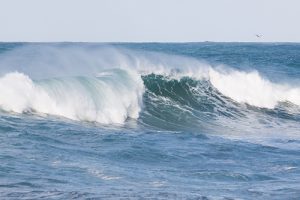Resilience is Key: Interns take on shoreline erosion with Maine DEP
By Sarah Delmonte
 The Mitchell Center and Maine Department of Environmental Protection (DEP) have been working together on a journey toward a sustainable future through the Future Sustainability Leaders (FSL) Internship Program for the past two years.
The Mitchell Center and Maine Department of Environmental Protection (DEP) have been working together on a journey toward a sustainable future through the Future Sustainability Leaders (FSL) Internship Program for the past two years.
Long before the devastating winter storms of 2023-2024, it was clear that Maine’s coastal communities were becoming increasingly vulnerable to the impacts of storm surge and sea-level rise. One important way to prepare for more extreme storms is to develop resilient infrastructure, which is exactly why DEP sought help from Mitchell Center faculty and students.
The collaborative project is focused on the growing problem of shoreline erosion along Maine’s coast, which can severely erode beaches and coastal highways and damage boats and buildings.
The project is one of 13 conducted by the FSL Internship Program. The program began in 2022 with the goal of giving undergraduate and graduate students the opportunity to gain real world experience tackling sustainability problems in Maine. Collaboration between research teams and outside organizations and agencies provides both a means to prepare students for taking on leadership positions and a supportive network to develop problem-solving skills.
The Beginning of a Partnership
Nathan Robbins, a climate change specialist at DEP, served as the lead mentor for the project. Robbins was a source of expertise for the two students who participated, providing them with detailed guidance related to research and policy. Jessica Jansujwicz, Sustainability Initiatives Lead at the Mitchell Center, served as a co-leader for the project. Other mentors included Mitchell Center faculty Lauren Ross and Parker Gassett, as well as John Maclaine from DEP’s Nonpoint Source Training Center. The two interns involved in the project were Melissa Genoter, an undergraduate student in environmental sciences, and Karina Cortijo-Robles, a graduate student in quaternary and climate studies.
Planning for the project began in spring 2022 with discussion between Jansujwicz and Robbins on what the internship would look like. Their aim was to create a project that allowed the intern to take on a leadership role with support from the DEP and Mitchell Center faculty, who would operate as an advisory team and provide feedback.
“The project with Nathan really started with a bunch of bullet points, but it took a lot more thinking, a lot more conversation, a lot more collaboration to see where the synergies were, where the interests were and what this project would really look like,” said Jansujwicz.
Phase One: Assembling the Crew

The first phase of the project got underway in September 2022 with intern Melissa Genoter. Her work involved navigating between multiple agencies and organizations to establish connections and provide a foundation for their goals.
“The first part of the project was about identifying the different agency visions and roles within the regulatory construct,” said Robbins. “We talked about the big picture. We talked to municipal officials, service provider organizations in the state who provide assistance to communities…contractors who were doing this work firsthand designing this infrastructure. We took a statewide approach.”
The main focus of this first phase was on networking and problem identification. During Genoter’s internship, she helped develop a shared understanding of the concept of ‘sustainable infrastructure’ and its central role in the project.
“Melissa really helped to define what we mean by ‘nature-based solutions’ and that was critical for the next steps of the program,” said Jansujwicz. “Out of the total shoreline in Maine, there is so little that actually has such solutions [implemented]. We don’t have many examples of this work which is why it’s very important to assess what is being done, and what needs to be done.”
Nature-based solutions rely on using living organisms to make the environment more resilient; for example, using plant-life and other natural resources along shorelines to combat erosion. A less sustainable option for reducing erosion is using riprap stabilization techniques, where the shoreline is sloped using plastic or fabric and then covered with rocks. Riprap stabilization techniques can have negative impacts on the surrounding environment including prevention of vegetation growth and structural integrity issues. By losing rocks to waves or fast flows, a riprap structure can begin to fail in its intended purpose.
Robbins emphasized how Genoter’s work provided the direction DEP needed to jumpstart the second phase of the project. After workshopping with the newly connected organizations, Genoter reported her findings and provided the DEP with recommendations for future action.
“I think we all left that project feeling like there was a lot to do, but we finally put a rudder on what was before a bit of a rudderless ship,” said Robbins. “It was hard to know what direction to go, but just in that first stage we built a lot of partners.”
Phase Two: Setting Sail

The second phase of the project involving intern Karina Cortijo-Robles occurred over the summer of 2023. According to Cortijo-Robles, her role was to communicate between researchers and contractors to create a tool for repairing erosion along Maine shorelines. The result of her work was the OUR SHORE assessment tool and guide. The tool is currently in a preliminary draft that is being shared with project partners and being tested by programs at DEP.
OUR SHORE provides a checklist for homeowners, contractors, and others involved with constructing shoreline stabilization projects to determine the impact of shoreline erosion on coastal properties. Once the cause of erosion is identified along with the severity, the tool provides numerous examples of green infrastructure design practices to restore the area. The goal of OUR SHORE is to improve shoreline resilience with the least amount of intervention.
“I was a facilitator between the different groups,” said Cortijo-Robles. “Maine DEP needed a person who could help with the creation of materials to spread the word.”
Cortijo-Robles explained that her outside perspective allowed her to analyze the project in a way similar to a member of the general public. This helped bring insight to the team when it came to communicating the project goals and research.
Although DEP already knew about the importance of nature-based solutions and green infrastructure, determining how to best communicate those solutions presented an obstacle. The support Cortijo-Robles received from her mentors allowed her to overcome these obstacles and develop the OUR SHORE stabilization guide.
According to Cortijo-Robles, collaboration among students in the FSL program was also important.
“I remember that I was talking with people from the anthropology and policy program,” said Cortijo-Robles. “You can create a space where people are working on different projects but at the end, we have the goal of creating leaders that can aid in the sustainability of the future.”
The Next Destination
The Resilient Infrastructure Project is ongoing, but Robbins explained how the assistance of the two interns helped create progress towards finding solutions for shoreline erosion in Maine. “We were very fortunate to continue working with the Mitchell Center through their Future Sustainability Leaders program,” said Robbins. “It’s been really exciting to be part of that program at the ground level.”
Maine DEP Commissioner, Melanie Loyzim, added, “This internship program with the Mitchell Center is a true win-win, contributing valuable insights that improve our services while training future leaders who will help steward sustainability initiatives in Maine.”
Sarah Delmonte is a Communications Intern with the Mitchell Center. Sarah is a senior undergraduate student majoring in English with a minor in Journalism.
